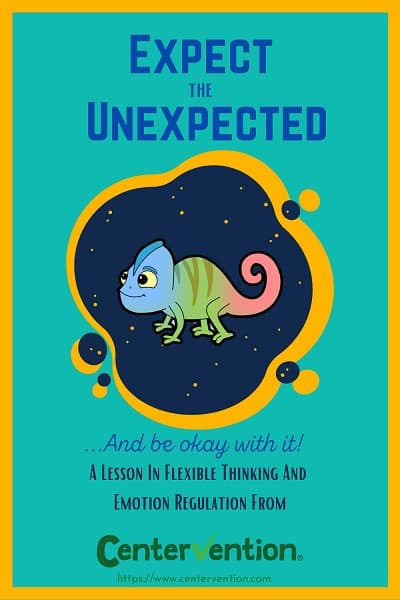The emotional regulation activities below will help students practice flexible thinking through a fun and interactive partner drawing game.
Sometimes things don’t go according to plan, and it’s understandable that students might get upset about it! Whether it’s a change in the schedule, a marker drawing that can’t be erased, or an unexpected change in the lunch menu, kids often have strong emotional reactions.
The ability to identify and manage emotions and feelings, or Emotion Regulation, requires responding to strong emotional situations in a socially acceptable manner. With students, this begins with developing flexible thinking, which allows them to consider and accept multiple outcomes over fixed expectations for a particular situation. We can nurture resiliency and foster a growth mindset by teaching them how to react and move forward positively from upsets, large or small. In fact, the unexpected can often be a starting point for even better things.
As Dr. Carla Shuman explains, “The sooner that we are aware of thought patterns that are preventing us from thinking flexibly, problem-solving, and finding silver linings in our cloudy days, the less likely we are to stay stuck in those patterns indefinitely. We can then see a world of options and possibilities where we can actively engage, rather than being a passive participant in our suffering.”
Recommended Grade Level: Elementary
SEL Skill(s): Emotion Regulation, Cooperation
Duration: 30 minutes per worksheet
Materials:
- Chart Paper, Markers, and Drawing Materials
- Partner Game Worksheet and Add On Cards (available when logged in to your Centervention Educator account)
Emotional Regulation Activities Instructions
Prompt: Ask students to share a time something didn’t go according to plan. Continue with:
- Can mistakes or unexpected things ever be good?
- What are some things we can do when we get upset about something unexpected?
Next, have students share with a partner how they would feel and what they would do if:
- They made a mistake on a drawing and couldn’t erase it
- The lunch menu said pizza but instead they got chicken
- The playground was closed for the day when they expected to go
Say: “Making a mistake or facing an unexpected challenge can cause strong feelings. It’s important that we think flexibly, or with open minds for change, and manage our feelings by practicing how to react and move forward positively in hard situations.”
Model: Tell students that sometimes what we think is a mistake or a challenge can help us come up with new and sometimes better ideas. Explain that you want to make a drawing of a face, but instead of sticking to the plan in your own head, you want to think flexibly and have them help.
- Draw an oval on chart paper to be a face.
- Have students take turns pulling Add On Cards to draw the features on the face—the sillier the better!
- Say, “That wasn’t exactly what I planned the face to look like—and it’s even better.”
- Write “WE CAN THINK FLEXIBLY” on the chart.
Practice: Have students work in pairs to play another game of Add On together, reminding them to have open minds and managed feelings about letting things go off plan. Younger students can start with the Silly Faces page, while older ones can enjoy the challenge of Partner Add On. Hang the masterpieces by the Flexible Thinking Chart for an awesome display of Flexible Thinking and Emotion Regulation.
Lesson Extension When Using Centervention Online Programs
In many of our online programs, students are faced with scenarios where they need to display flexible thinking and find a way to compromise with another character.
In Episode Seven of Adventures Aboard the SS GRIN, the player and Stop and Think Girl both want to steer the ship. And they must work towards a compromise where they each will take a turn steering even though neither of them will get exactly what they wanted.
The lesson above is a great extension to the scene in SS GRIN, and it can be an excellent way to reinforce learning for an important social emotional skill.
Additional Resources
Related Lessons and Programs

